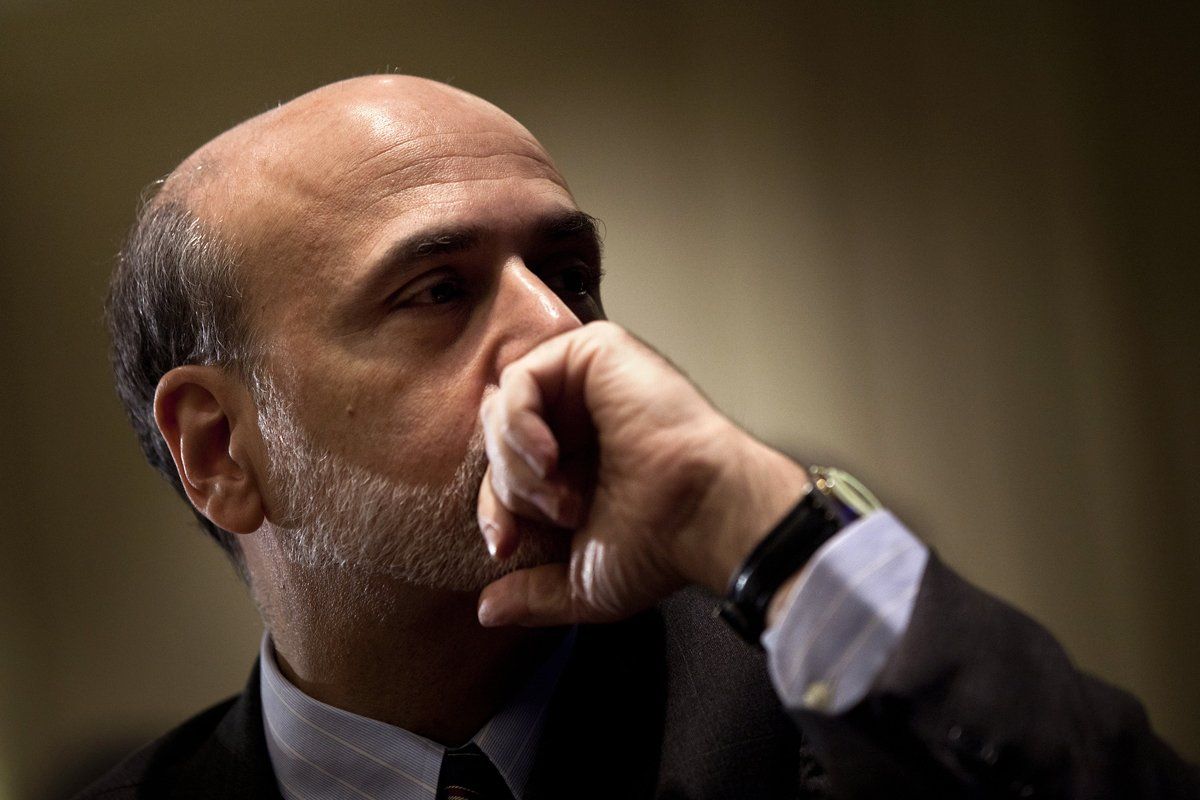
The phrases "Federal Reserve Bank" and "Valentine's Day" haven't appeared in too many sentences together. But this is the social-media age, and so it was perhaps inevitable that someone in the Twitterverse started a thread for people to send valentines to the Fed. "When I see your yield curves," one tweeter wrote, "I get too big to fail."
They got a huge kick out of it in that mysterious building down on Constitution Avenue, where jocularity and love are more typically in short supply. Not long before Valentine's Day, Fed chairman Ben Bernanke was up on Capitol Hill for another of his ritualistic lecture sessions from Republican lawmakers. House Budget Committee Chairman Paul Ryan badgered him about inflation (which does not exist now, but which Ryan and many other Republicans swear is coming in a big way). Another Republican upbraided him over a recent Fed report on the housing market that the lawmaker said stepped on Congress's toes. All this is to say nothing of the more visceral hatred Bernanke and the bank have inspired: those lusty chants of "End the Fed!" heard at Ron Paul rallies.
Dig beneath the level of political white noise, though, and you hear a different story—about a modest and even shy man who is one of Washington's quiet heroes. Bernanke's defenders insist that he has pursued surprising and bold policies in the face of scorching political opposition. "I think he's going to go down as one of the most creative chairs of the Fed ever," says Jared Bernstein, formerly Vice President Biden's chief economist.
When President Bush made him chair in 2006, Bernanke was a typical moderate-to-conservative Republican who was initially regarded as too academic and cautious. He understood macroeconomics, but he didn't have a great grasp of markets, some said, and he didn't get politics at all. Then the crisis hit. (Note: my sister, Susan Tomasky, is a director of the Cleveland Fed.)
There are critics, mostly on the left, who think Bernanke was way too slow to see what was happening. "As someone who'd sat on the Fed since the summer of 2002, he could hardly have been excused for not having seen the housing bubble before the summer of 2007," says the liberal economist Dean Baker, one of the few who did predict it all.
Other economists cut him more slack because the country was in such an unprecedented situation. "It wasn't possible to follow the existing rule book," says Michael Woodford of Columbia University. Bernanke brought to the situation one key tool, though: his deep study in his academic years of the Depression. "The Fed of the 1930s," Bernanke told Newsweek, "took a very conservative approach, and it failed." And so this Republican came to admire FDR's "willingness to be bold and to go beyond orthodox prescriptions"—like taking the country off the gold standard and establishing deposit insurance.
The steps Bernanke took—low interest rates and quantitative easing to increase the money supply—are now well known. The extent of the intervention perhaps less so, but consider this fact: the Obama stimulus bill that remains so controversial had a price tag of about $800 billion. The Fed has pumped around $2 trillion into the economy in stimulus. And it has made money while doing it, last year contributing $77 billion in remittances to the U.S. Treasury (pre-crisis remittances typically ran around $30 billion).
The criticisms of Bernanke aren't without substance: conservatives don't like monetary stimulus any more than they like the legislative version. But often the attacks boil down to the idea that Bernanke's policies are helping dig President Obama out of a hole. "The right wing is attacking things the Fed does that are clearly in the national interest," says Barney Frank, the leading Democrat in the House on Fed matters. "They are frustrated because Bernanke is supposed to be one of their guys. Some of them think, Why is Bernanke doing this?"
The Fed of the 1930s took a conservative approach,' Bernanke says,'and it failed.
Fed watchers rate Bernanke highly on other counts. Most are impressed with the transparency he's brought to the notoriously secretive institution. There is open dissent now at Federal Open Market Committee meetings, something that didn't happen much under Alan Greenspan. "He changed the way the FOMC is run and the way it communicates with the public," says Donald Kohn, a former Fed vice chair who worked under Bernanke until 2010.
It hasn't been an easy ride. Before becoming the chair of the Fed, Bernanke had never run anything more consequential than a township school board in New Jersey and the Princeton economics department. He's had a steep learning curve, but most observers have been impressed by the way Bernanke has adapted to trying times. Now if the economy continues to follow suit, those Fed valentines will keep on coming.
Uncommon Knowledge
Newsweek is committed to challenging conventional wisdom and finding connections in the search for common ground.
Newsweek is committed to challenging conventional wisdom and finding connections in the search for common ground.
About the writer
To read how Newsweek uses AI as a newsroom tool, Click here.








